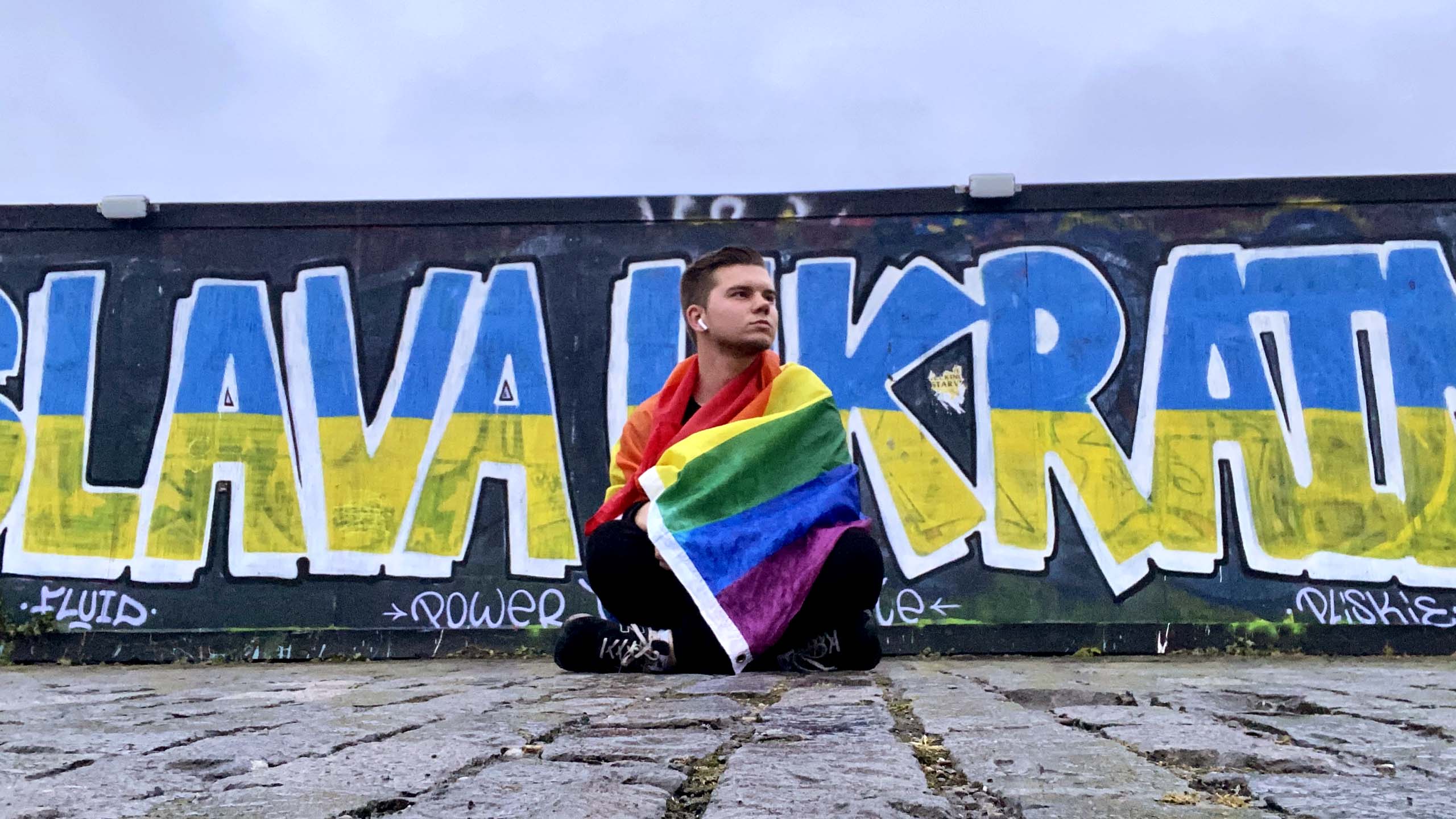Activist and journalist Nick Eddinton woke up to hundreds of news updates and messages early in the morning on Feb. 24, 2022.
On the messaging app Telegram, what he calls “terrifying” accounts from friends in Kyiv were rolling in. Russia was bombing the capital city: the invasion of Ukraine had begun just hours earlier.
“Honestly, I was not surprised. I was still terrified … but I was not surprised,” Eddinton tells Xtra.
At the time, Eddinton was living in eastern Ukraine, in a Russian-controlled area (it was requested that the specific city name was not shared for safety reasons). In the weeks leading up to the invasion, he “saw something going on” with the local military—troops were heading into the city—but he thought it was maybe an escalation of a local conflict, not a full-scale invasion.
As a 21-year-old gay man he had reason to fear. Even before the invasion, the Russian-occupied area had been unsafe for LGBTQ+ people. Access to LGBTQ+ healthcare services was limited, there were no public LGBTQ+ advocacy organizations or easily accessible resources and it was difficult for community members to date safely or connect socially, Eddinton says.
In its latest World Report on the Russian Federation, Human Rights Watch said Russia’s record on LGBTQ+ rights was consistent over the last year: “The government continued its trajectory of anti-lesbian, gay, bisexual and transgender (LGBT) discrimination.” Recently, in December, Russia expanded some of its oppressive anti-LGBTQ+ laws, including the 2013 “gay propaganda” law. It is now illegal to promote LGBTQ+ relationships, to express non-heterosexual orientations publicly or suggest that LGBTQ+ orientations are “normal,” CNN reported on Dec. 5, 2022.
“It’s impossible to continue a safe life…. Russia is so homophobic. I felt this all the time in my life in the occupied area,” Eddinton says.
The situation deteriorated further with the invasion. Eddinton says LGBTQ+ people became “very vulnerable” and more marginalized. Military activity in the eastern occupied area escalated and Eddinton believed his own safety was in question.
“Russia started the forced mobilization of Ukrainian men,” Eddinton recounts. “It was so dangerous because the Russian army was in the street, took Ukrainians and sent them to fight on the front line against their own country.
“All the time, I tried to speak with my Ukrainian friends and help my country, but, every month, life in the warzone became more dangerous for me,” he adds.
Eddinton applied to the “Homes for Ukraine” visa program in Scotland shortly after it was launched mid-March and was accepted. The program helps sponsor and support Ukrainians fleeing the war.
“I was so pleased when Scotland gave me the opportunity to be safe,” Eddinton says.
By early April, Eddinton says, the situation in the occupied area was “worse every day,” and it was time to leave Ukraine.
“If I miss this chance to evacuate, it will be impossible in future to evacuate,” he remembers thinking.
Through his connections, he secured a ride to the nearby Russian border. But he had to raise $1,000 for the journey, and he had around 10 hours to do so: it was the evening of April 9 and the driver was departing the next morning.
“One thousand dollars for people who live in [the] occupied area—it’s so much; it’s big money,” he says. “My journalism connections helped to find money for this, like non-profit donations, and my close friends helped me to find this money at night.”
In the morning, he left his home, embarking alone on a “long and dangerous ride.” There were three other people in the car. On the way out of the occupied area, Eddinton remembers seeing Russian military checkpoints every 5-10 kilometres. The driver tried to avoid them wherever possible: Eddinton says they were stopping cars and looking for men for military service.
After crossing the border into Russia, he took a train north to Moscow—which he says felt like an “Orwell novel,” with increased propaganda, and a “police state,” as there was heavy police presence—where he arranged his travel to Scotland.
“I felt a little bit more safe because I left the occupied area, but, honestly, I did not feel safe before I left Russia,” he says.
Boarding a bus west to Latvia, Eddinton remembers that it was “90 percent” full of Ukrainians who were evacuating to Europe. As they left Moscow, they were stopped at more “stressful” military checkpoints.
When they reached the Russia-Latvia border crossing, the bus had to wait for four or five hours for the authorities to check and process documents. During the wait, Eddinton worried and wondered what he would do if there were any issues with his paperwork.
“It’s maybe 100 metres between the Russian border and the Latvian border,” he remembers assessing from the bus. “And, one moment, I had the idea that maybe I just … run to Latvian border. Because I can’t imagine if I don’t have the right to leave and have to stay in Russia: it was a terrifying idea for me. But I was lucky.”
Minutes after the bus crossed into Latvia, Eddinton saw the blue-and-yellow starry European Union logo appear and his emotions overwhelmed him: he didn’t think he would actually survive the journey.
“I was like ‘Oh, my heart. The nightmare—it’s finished,’” he says.
“I was so emotional because it was unbelievable.”
After a 10-hour stopover in Riga, Latvia’s capital, and then an overnight flight, Eddinton finally arrived in Edinburgh, Scotland, on April 24, two weeks after leaving his home in the occupied area.
“When I was free, I couldn’t wait to start my new life,” he says.
Back in the spring, similar to the U.K.’s “Homes for Ukraine” initiative, Canada created a program to support Ukrainians fleeing violence, the Canada-Ukraine authorization for emergency travel (CUAET).
The CUAET allows Ukrainians to seek “temporary safe harbour” in Canada for up to three years.
The program “opened the door” for many Ukrainians wanting to find a new life, says Lenny Emson, a bigender LGBTQ+-rights activist, founder of KyivPride Canada and senior managing director at KyivPride, two non-profit organizations supporting LGBTQ+ Ukrainians.
“KyivPride Canada started receiving a lot of requests from people who wanted to come to Canada, but had some troubles on the way,” he says.
In October, KyivPride opened an official call to help with relocation support for LGBTQ+ Ukrainians in Ukraine, Europe and beyond. KyivPride and KyivPride Canada were hearing from people needing help in many ways, at different stages. With the help of international partners, Emson said their teams helped with supports, including anything from accessing the CUAET visa application documents and assisting with English translation; to organizing safe travel to embassies in Europe; arranging accommodation for newcomers on their journeys to Canada; securing financing for plane tickets and offering accommodation and settlement support in Canada.
Initially, with the help of its Canadian partners, KyivPride Canada had some community resources to assist LGBTQ+ newcomers settle, Emson says, but quickly reached their capacity to help everyone on their own.
This led KyivPride Canada to put out a call on social media on Dec. 23, 2022, asking LGBTQ2S+ Canadians and allies for help.
That’s how The Friendly Homes Project came to be. KyivPride and KyivPride Canada, working together with the We Support LGBTQ Ukraine Fund in Canada, developed a program to provide assistance to LGBTQ+ newcomers.
“The goal of the whole project is to help the person from the moment that they decide that they are going to flee the war to Canada, to the moment when they are finally here, settled, and all is good—to support them along the whole way,” says Emson.
The organizations are asking for help in three main areas: providing temporary accommodation to newcomers, assisting newcomers with securing employment and acting as a local connection and helping newcomers settle into their new communities.
“So, support them with getting their paperwork done, finding a job, settling in Canada, finding new friends, you know,” Emson says. “All this is very important because being a migrant is always a hard job.”
A welcoming environment is vital, Emson adds, especially for LGBTQ2S+ newcomers, because they can face discrimination within the migrant community.
“Very often, in the migrant community, LGBTQ+ people are discriminated [against], harassed and bullied,” Emson says. “And, unfortunately, it has been a very negative experience through all the countries we’re working with, and we would like to avoid this in Canada.
“Unfortunately, many migrants, including Ukrainian migrants, bring their homophobia and transphobia from back home to the new country,” he adds.
Through The Friendly Homes Project, the hope is that LGBTQ2S+ Canadians will understand the struggles of LGBTQ+ Ukrainian newcomers and will help build a safe space for them here. Emson says the experience has been “very positive” overall, particularly for those who have had strong settlement support from the Canadian LGBTQ2S+ community and allies.
“Of course, for people who have never been to Canada, it is a bit of a shock because we’re different planets, let’s be honest here,” he says, noting that the cultures and day-to-day life in the two countries are very distinct. “So, it is very important to have a friend, to have a helping hand, who will help you to navigate through all this.”
It’s only been a few weeks, yet The Friendly Homes Project has received an “amazing” response, Emson says. To date, KyivPride Canada has received over 100 applications from Canadians who want to help the cause. They are looking forward to the next stages, Emson adds, when they host online information sessions for the hosts to introduce them to KyivPride Canada, the newcomers and the project.
He says, “This is a very important process [where] every detail matters.”
The CUAET received nearly 800,000 applications between March 17, 2022, and Jan. 17, 2023: 791,016 Ukrainians have applied for visas and 503,100 have been approved. To date, over 145,000 Ukrainians have arrived in Canada.
“Statistics say that in each population or group, 5-10 percent would be LGBTQ+,” Emson says.
“If 700,000 applied for this visa, can you imagine how many LGBTQ+ people can be among those numbers?” he adds.
Eddinton was one of the 145,000 Ukrainians.
For eight months in Scotland, he had been navigating day-to-day life in the U.K.: Eddinton built on his English-language skills and worked as a journalist for Truthful Reporting and other outlets, continually covering Ukrainian news and sharing Ukrainians’ stories. As an activist, he worked as a program coordinator at Ukrainians Protest Edinburgh and as a volunteer with Help Ukraine Scotland, Edinburgh.
During that time, he discovered that there were opportunities for LGBTQ+ Ukrainians to relocate to Canada with support from KyivPride and KyivPride Canada and Eddinton faced a “difficult decision.”
On the one hand, he had many friends who remained in Europe—in Ukraine and other countries—and he had established a new life in Scotland. But on the other, he believed that Canada could offer different options for activism within the large Ukrainian diaspora community by raising further awareness about the Russian invasion and impacting policy to support Ukraine.
And so, he braved another journey, taking the longest flight of his life from Edinburgh to Toronto on Dec. 12, before travelling on to Ottawa, the city he now calls home. Eddinton is staying with a host family he calls “kind” and remains busy as a journalist and activist.
“I want to say thank you to KyivPride, who helped me with the relocation program, because for LGBTQ+ people from Ukraine, this is an important opportunity to start a new life in a new country where the government protects rights for LGBTQ+ people,” Eddinton says. “Canada is a country that supports Ukrainians in Canada and in Ukraine.”
“I’m trying to continue to support Ukraine because I understand that I was so lucky to escape occupied territory and to be safe,” he adds. “I am safe, but a lot of my friends in Ukraine are not safe.”


 Why you can trust Xtra
Why you can trust Xtra


